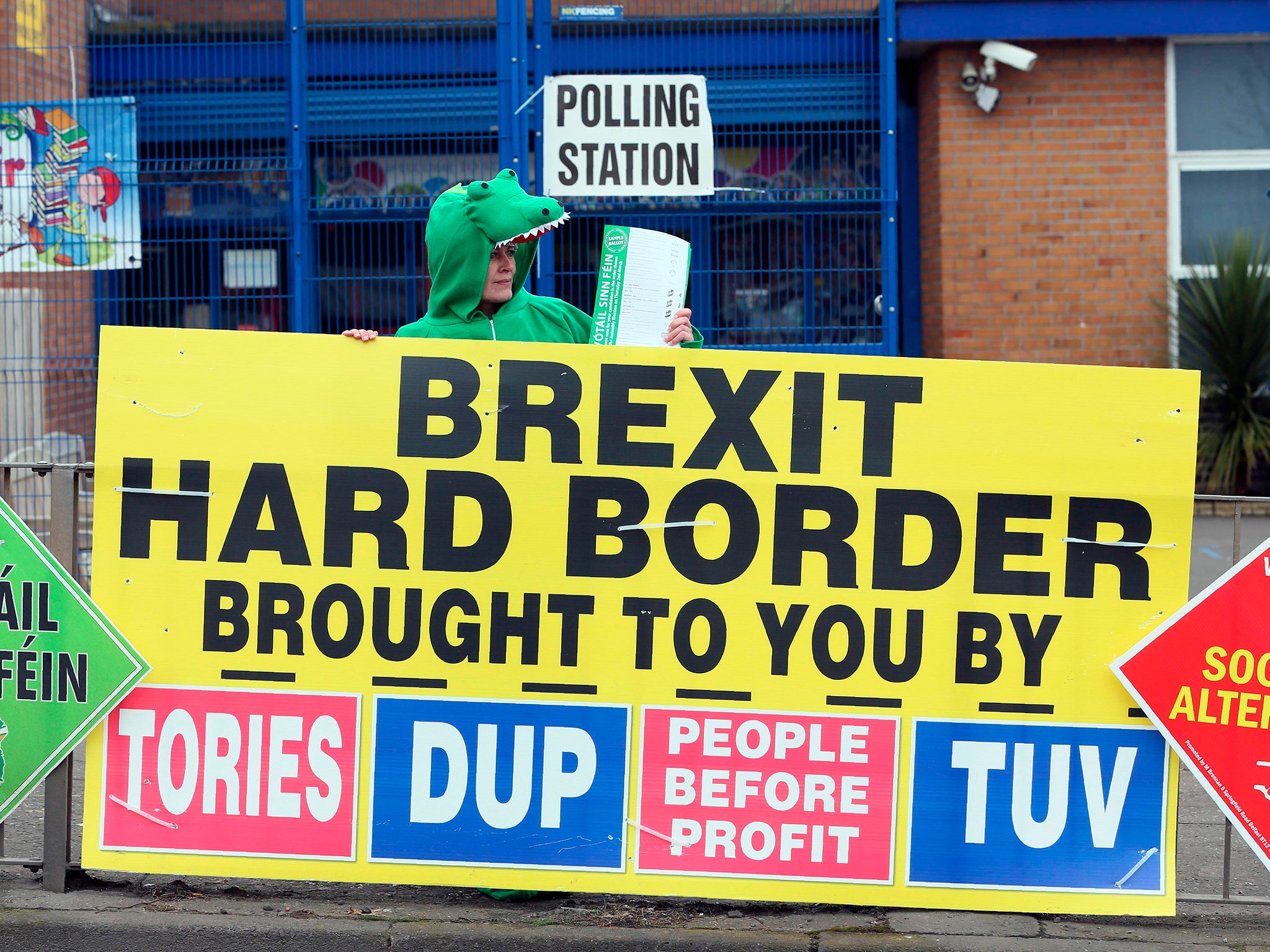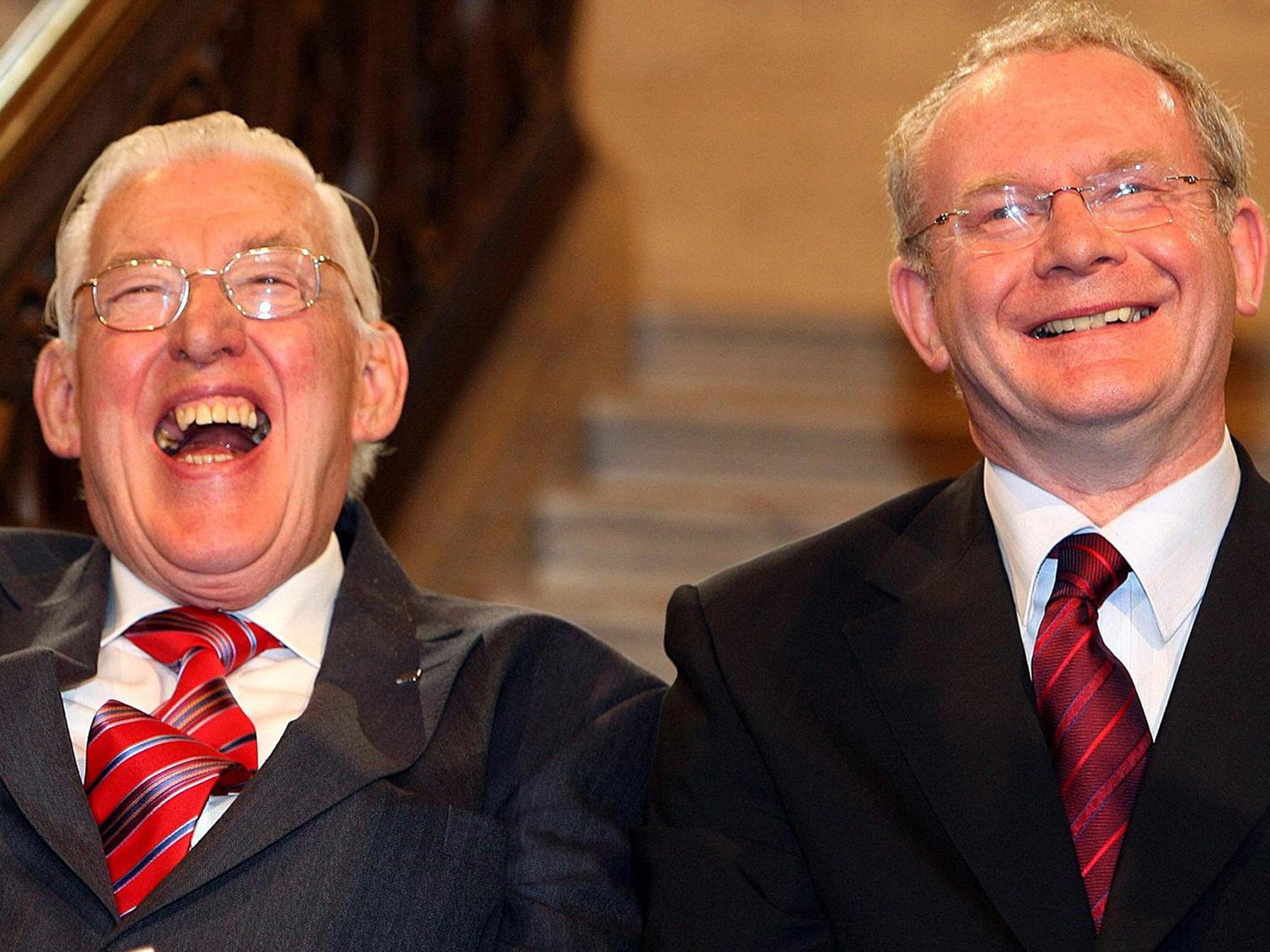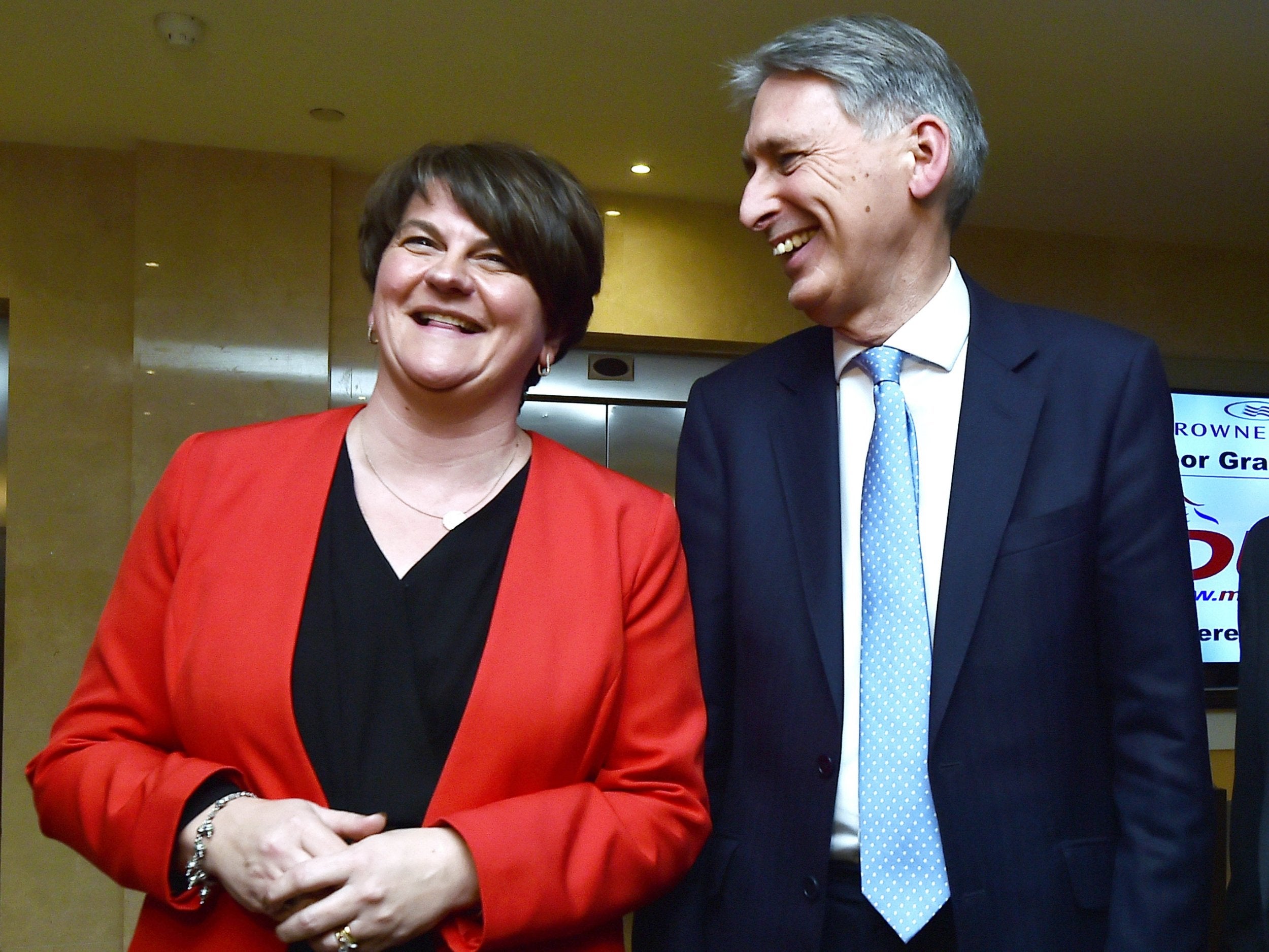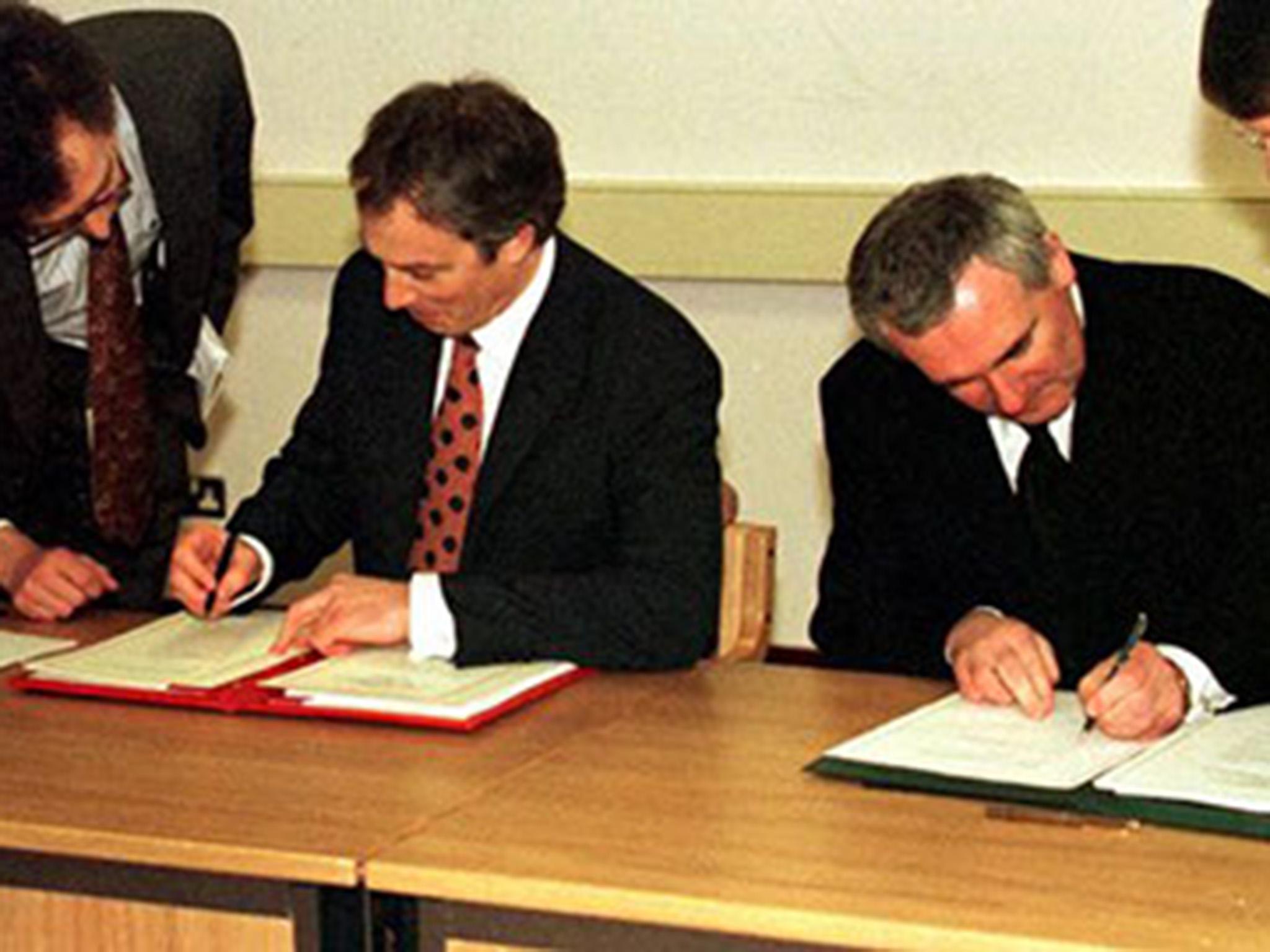The DUP’s intransigence over Brexit leaves Northern Ireland once again at the crossroads
In the latest in his series examining Brexit’s impact around the UK, Patrick Cockburn concludes that the political landscape in Northern Ireland is painfully familiar


In February 1969 I was in County Fermanagh reporting what was billed as a “crossroads election”, in which Northern Ireland would choose between limited reform and a one-party Protestant and unionist state. I remember the campaign well because it was the subject of an article I was producing for a university magazine, the first I ever wrote for any publication.
The election was considered particularly important because the Northern Irish prime minister, Terence O’Neill, was seeking endorsement of his policy of moving towards granting civil and political rights to the Catholic minority – a policy over which his own unionist party was split.
I had a sense early on that it was already too late for compromise because institutionalised anti-Catholic discrimination had cut too deep for change to come without violence.
There were signs of this in the villages and small towns around the lakes of Fermanagh. I was following the campaign of a Catholic candidate who held progressive opinions. One evening we saw a group of men standing beside the road and he made a short speech denouncing the unionist establishment. After he had finished, one of the men said that the candidate had no need to worry “because nobody here is going to vote for a Protestant”.
Like many appeals to the moderate centre in Northern Ireland over the past half century, O’Neill’s did less well than many expected. The prime minister said he had received 150,000 letters supporting political compromise, but these failed to turn into enough votes on election day to give him the mandate he needed.
He won only a slim majority among pro-reform unionist MPs and was humiliated when he almost lost his seat in Bannside to the virulently anti-Catholic preacher Ian Paisley, who was just gaining prominence in Northern Irish politics. O’Neill resigned as prime minister a few months later and Paisley went on to win the seat in the next election in 1970 as the candidate for the Protestant Unionist Party, which soon afterwards changed its name to the Democratic Unionist Party (DUP).
Half a century later many things have changed in the world, from the fall of the Soviet Union to the wars in Afghanistan and Iraq that followed 9/11, but the DUP is very much the same today as it was then.
The only (big) difference is that it is no longer a fringe party but one that provides the essential parliamentary support to keep the British government in power. Its views are eagerly and respectfully sought by politicians and media alike as to the terms under which Britain should leave the EU, seemingly ignoring that the DUP agenda is very different from that of the Conservative Party and other Brexit supporters.
One of the many extraordinary things about Britain in the age of Brexit is that the nature and history of the DUP is not more closely examined. On the other hand, it is in keeping with a tradition in Britain of proud ignorance of Irish politics north and south as something not worth considering. This despite the fact that the fate of the Northern Irish backstop is a lead item in newscasts and at the centre of the most important decision in UK history since the Second World War. Tony Blair was one of the only British leaders to know much about Northern Ireland, which explains why he was able to negotiate the Good Friday Agreement (GFA) in 1998 that ended three decades of fighting.
Paisley mellowed in his last years, becoming first minister of the Northern Ireland Executive in 2007, but the DUP changed less than he did and remains closer to the uncompromising and sectarian views that he espoused for most of his career. Once he was asked about building bridges between the Protestant and Catholic communities in Northern Ireland and his reply explains much about the DUP’s approach today. “Where do bridges go?” he asked rhetorically and gave the classic response, damning in his eyes, that “they go over to the other side”.

There is strong evidence that the DUP leader Arlene Foster, who opposed the GFA as a member of the Ulster Unionist Party before joining the DUP, still thinks along these lines. Asked in 2017 why she had not compromised with Sinn Fein, the dominant Catholic and nationalist party and her partner in the power-sharing Northern Ireland Executive, she replied: “If you feed a crocodile it will keep coming back and looking for more.”
She later expressed regret for the crocodile comparison but her record in office appeared to back up her words in the eyes of Catholics, who now make up half the 1.9 million population of Northern Ireland.
Later the same year, Theresa May lost her parliamentary majority in the general election and reached a confidence and supply agreement with the DUP. This came with a £1bn subsidy for Northern Ireland in addition to the usual UK annual grant of £11bn a year.
It was an extraordinary piece of luck for the DUP, though perhaps less lucky for the UK as whole, that the party should hold the balance of power at such a critical moment, though its beliefs had changed little since the first years of the Troubles.
Dr John Kyle, a councillor for the Progressive Unionist Party on Belfast City Council and GP in the Protestant heartland of east Belfast, has had a close-up view of the DUP in action over many decades.
He says: “The DUP remains socially conservative, politically right wing, strongly sectarian, very pragmatic, tough negotiators and always reluctant to change.” He adds that the central ground in Northern Irish politics remains sparsely inhabited because of the polarisation which has been exacerbated by Brexit.
The DUP wins elections, he goes on, “because, when push comes to shove, it plays the constitutional card [saying that the union with Great Britain is under threat] and people are nervous of voting any other way that would give the victory to the opposition [Sinn Fein]”. Kyle adds that Sinn Fein benefits in exactly the same way in persuading Catholic voters to rally around their candidates to stop the unionists.
The DUP is much more like the Republican Party in the southern states of the US, with its backbone of fundamentalist evangelical Christians, than it is like other British political parties
Alison Morris, the security correspondent of The Irish News, says that everything is going the DUP’s way: “The party can say ‘we are practically in power in Westminster and we have all this confidence and supply money’. They are drunk on power. They like Brexit because it is all about old-fashioned British identity. They want nothing to do with the South [Irish Republic]”.
Given its undoubted influence in Westminster, the DUP has no need to share power with anybody in Northern Ireland and is likely to do even better than before in the next election there.
Yet the DUP remains a stranger movement than most people notice when watching its MPs being interviewed by the British media. At its core are two highly sectarian and regressive organisations: the Free Presbyterian Church, founded by Ian Paisley in 1951, and the Orange Order.
Three in 10 (30.5 per cent) of the DUP membership belong to the Free Presbyterians according to The Democratic Unionist Party: From Protest to Power by Jonathan Tonge, Maire Braniff and others, who interviewed three-quarters of the party’s members. This is a high proportion of the DUP given that there are only 10,068 Free Presbyterians, who make up 0.6 per cent of the Northern Irish population.

Belonging to the Orange Order is the other feature which distinguishes the DUP, with 34.6 per cent of members belonging to an organisation whose determination to parade through Catholic areas has frequently provoked sectarian violence in the past (though much reduced today by the rerouting or banning of parades going through sensitive areas).
The DUP is thus much more like the Republican Party in the southern states of the US, with its backbone of fundamentalist evangelical Christians, than it is like other British political parties. Its social policies on issues like abortion are regressive and it has a tradition of homophobia that has not changed since Ian Paisley led the “Save Ulster from Sodomy” campaign in 1977.
The fortuitous political triumph of the DUP comes at the moment when the Protestant and unionist community is on the retreat socially and demographically
Lord Patten, the former Conservative Party chairman and EU commissioner, who is one of the few British political leaders with knowledge of Northern Ireland, is quoted as saying in a newspaper interview this week that Theresa May’s deal with the DUP in 2017 was “a huge mistake”. He believes that the British government has “compromised its balanced position on Northern Ireland in order to get into bed with the DUP”.
The DUP denies that it wants a hard border, which would be economically devastating for many of the businessmen and farmers who vote for the party. But it is widely suspected in Northern Ireland that this is not true and that at heart the party does want a hard border dividing Northern Ireland from the Irish Republic because this would be a death blow to the Good Friday Agreement. Foster said last October that the agreement was not “sacrosanct” and could be changed in order to take account of Brexit.

“The DUP were never in favour of the GFA,” says Morris, arguing that there is nothing surprising about the party’s hostility to the Good Friday Agreement. “They voted against it at the time. Why should they protect it now? It was meant to have fairly similar nationalists and unionist forming a government. But the DUP and Sinn Fein disagree on almost every economic and social policy. They don’t even agree what to call the place: Sinn Fein still calls it the North and the DUP Northern Ireland.”
Surprisingly Sinn Fein leaders do not sound concerned about the DUP’s predominance, arguing that it is only temporary and will end as soon as the DUP no longer holds the balance of power in Westminster. There may be an element of wishful thinking in this; and political parties all like to imagine that the successes of their opponents are Pyrrhic victories. But Lord Patten argues that the DUP does “more for Sinn Fein than Sinn Fein does by undermining confidence in the existing economic and political relationships between Northern Ireland and the rest of the UK, Europe and the Republic of Ireland”.
The Catholic community is relying on another long-term factor which it believes will negate any tactical gains made by the DUP. Their numbers are growing faster than the Protestants and they will be in the majority by 2021, which is coincidentally the hundredth anniversary of the foundation of the Northern Irish state.
Of equal importance is that the Catholic community is becoming more prosperous and better educated than the Protestants. Once it was the Catholics who worked in menial jobs and had twice the unemployment rate of Protestants – 18 per cent compared to 9 per cent in 1972 – but this gap has disappeared. The Catholic middle class was the great beneficiary of the peace process and Catholics make up 60 per cent of those in higher education.
Queens University in Belfast is increasingly seen as a “green” institution, while Protestants often go to Scottish or English universities and many do not return after graduating. Catholics increasingly dominate professions like law, medicine, and accountancy.
“The professional classes are increasingly populated by the nationalist community,” says Dr Kyle, adding that young working-class Protestants in east Belfast would historically have gone into the shipyards and worked as welders, painters, plumbers – heavy industrial jobs which have now disappeared. Ironically, Catholics were less vulnerable to de-industrialisation because discrimination had prevented them getting the industrial jobs that have now disappeared.
Morris recounts her own family background to illustrate this trend: “My mother was a cleaner, she had eight children; my father was mainly unemployed because of the Troubles. She was pulled out of school when she was 14 to mind the other children, but she was obsessed with education, as many Catholic families were, and she pushed us all to go to grammar school.”
The fortuitous political triumph of the DUP comes at the moment when the Protestant and unionist community is on the retreat socially and demographically.

Dr Kyle says that “most unionists would feel that it is only a matter of time before a majority of the population are from nationalist or Republican backgrounds”. He believes that DUP “arrogance and smugness”, and its effort to impose Brexit despite a majority in Northern Ireland being opposed to it (56 to 44 per cent in the referendum in 2016), will be counterproductive because it alienates nationalists and middle-class unionists.
The Good Friday Agreement is being undermined by the prospect of a hard border despite its great success as a historic compromise between the two communities. The economic benefits are visible everywhere. Metropolitan Belfast, with a population of 600,000, looks more prosperous than many cities in the rest of the UK.
It is this success which is now being put at risk. That does not mean there will be a rerun of the Troubles after 1968-69, but it does mean that friction between Catholics and Protestants is on the rise again after falling in recent years.
Morris recalls reporting on Orange Order parades around 12 July, usually a peak point in sectarian violence. “I would often return home at four or five in the morning covered in bruises from metal bolts thrown during the parades,” she says. But clashes have become far less frequent and in the last three years, she says: “I have often found myself sitting in a bar with a glass of wine in my hand by seven in the evening.”

This trend could go into reverse as Brexit pushes up the political temperature in Northern Ireland. The lack of concern and ignorance about what might happen is illustrated by the way in which Brexiteers denounce the backstop as a conspiracy by the EU and the Irish Republic to trap Britain in the customs union rather than as a necessary measure to prevent a hard border which would topple the Good Friday Agreement.
The GFA was probably the greatest achievement of the British state over the last half century. The DUP would like to see it go or strip it of any meaning, and it may well succeed. As during the general election of 1969, Northern Ireland is once more at the crossroads.
Join our commenting forum
Join thought-provoking conversations, follow other Independent readers and see their replies
Comments
Bookmark popover
Removed from bookmarks